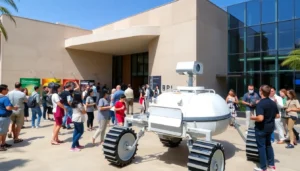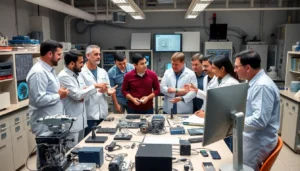Table of Contents
ToggleIn a world where technology propels us forward faster than a rocket, careers in rocket software are blasting off like never before. If you’ve ever dreamed of coding the next big thing in aerospace or simply want to impress your friends with your knowledge of orbital mechanics, this field might just be your launchpad.
Overview of Rocket Software Careers
Rocket software careers offer exciting roles in the aerospace technology field. Professionals work with coding, data analytics, and orbital mechanics to develop innovative solutions.
What Is Rocket Software?
Rocket software encompasses a range of applications and tools designed for the aerospace industry. Platforms streamline processes, enhance data management, and improve system integration. Companies utilize this software to develop mission-critical systems, manage satellite operations, and analyze flight data. Engineers, developers, and data scientists often collaborate to create these advanced technologies, ensuring they meet the rigorous standards of aerospace applications.
Why Choose a Career in Rocket Software?
Choosing a career in rocket software presents unique opportunities for growth and innovation. Passion for technology, exploration, and problem-solving drives many individuals toward this field. The industry continuously evolves, providing professionals access to cutting-edge projects and technologies. Additionally, job stability and attractive salary potential appeal to many candidates. Those interested in contributing to space exploration and technological advancement find this career path particularly rewarding.
Key Roles in Rocket Software

Rocket software careers encompass various vital roles that drive innovation in the aerospace industry. Each role plays a crucial part in ensuring the successful development and implementation of advanced aerospace technologies.
Software Development
Software development in rocket software involves creating applications that support aerospace missions. Developers write code to enhance functionality, improve the user experience, and streamline processes. They utilize programming languages like C++, Python, and Java. Collaboration with engineers ensures alignment between software capabilities and engineering requirements. Continuous learning and adaptation to new technologies help developers stay competitive in the field. Many projects require working with simulation software to model real-world scenarios, thereby enhancing accuracy in aerospace applications.
Quality Assurance
Quality assurance ensures that rocket software meets stringent safety and performance standards. QA professionals design testing protocols to identify bugs and verify software reliability. They perform both manual and automated testing processes to validate functionality and performance. Problem detection early in the development phase minimizes risks during deployment. Regular collaboration with development teams fosters effective communication and expedites issue resolution. Staying current with industry standards and best practices enhances the credibility of the software developed.
Project Management
Project management in rocket software coordinates various aspects of software development. Managers oversee timelines, budgets, and resource allocation to guarantee project success. Skilled project managers facilitate communication among team members, ensuring everyone remains aligned with project goals. Risk assessment and mitigation strategies form an essential part of their responsibilities. Successful project managers leverage methodologies like Agile and Scrum to enhance productivity and adaptability. Focused on delivering high-quality outcomes, they maintain stakeholder engagement throughout the project lifecycle.
Skills Needed for Rocket Software Careers
Working in rocket software careers requires a blend of both technical and soft skills, essential for navigating the complexities of aerospace technology.
Technical Skills
Proficiency in programming languages such as C++, Python, and Java forms the backbone of software development in the aerospace sector. Familiarity with software development tools and environments enhances productivity and efficiency. Understanding data management practices is crucial for handling vast amounts of information in aerospace applications. Knowledge of algorithms and data structures supports the creation of high-performance software. Expertise in systems integration ensures seamless compatibility between software components and engineering systems. Development methodologies like Agile and Scrum facilitate effective project management and collaboration within teams.
Soft Skills
Effective communication skills enable collaboration among multidisciplinary teams, ensuring alignment between engineers and developers. Strong problem-solving abilities allow professionals to address challenges quickly in dynamic environments. Adaptability to rapidly changing technologies and workflows is vital for success in the evolving aerospace industry. Teamwork and collaboration skills foster a cooperative atmosphere essential for innovation. Critical thinking plays a significant role in evaluating solutions and making informed decisions. A passion for technology and exploration drives engagement and motivation within this exciting field.
Career Growth and Opportunities
Rocket software careers offer diverse pathways for growth and innovation. Individuals passionate about aerospace technology can discover numerous opportunities for advancement within the industry.
Advancement Paths
Career advancement in rocket software includes multiple routes. Software engineers often progress to senior development positions, whereas others may transition into leadership roles. Quality assurance professionals can specialize further, moving into test engineering or management. Project managers may find opportunities as program managers or directors of engineering, broadening their responsibilities. Continuous learning through certifications in programming or project management enhances prospects for advancement. Furthermore, staying updated on industry trends ensures professionals remain competitive in the evolving landscape of aerospace technology.
Networking and Professional Development
Networking plays a vital role in the advancement of rocket software careers. Industry conferences, workshops, and local meetups provide valuable opportunities for connecting with peers. Building relationships with mentors in the aerospace sector encourages growth and knowledge sharing. Engaging in online platforms like LinkedIn helps professionals stay informed about job openings and industry developments. Participating in relevant professional organizations offers access to educational resources and collaboration opportunities. Ultimately, cultivating a robust professional network significantly enhances career prospects in this dynamic field.
Rocket software careers offer a unique blend of excitement and opportunity for those eager to explore the aerospace industry. With a focus on innovation and collaboration, professionals in this field can significantly impact space exploration and technological advancements. The demand for skilled individuals continues to grow as the industry evolves, providing a stable and rewarding career path.
Embracing continuous learning and networking can further enhance prospects in this dynamic environment. By developing both technical and soft skills, individuals can position themselves for success in various roles, from software development to project management. The future of rocket software is bright, inviting passionate individuals to contribute to groundbreaking advancements.







